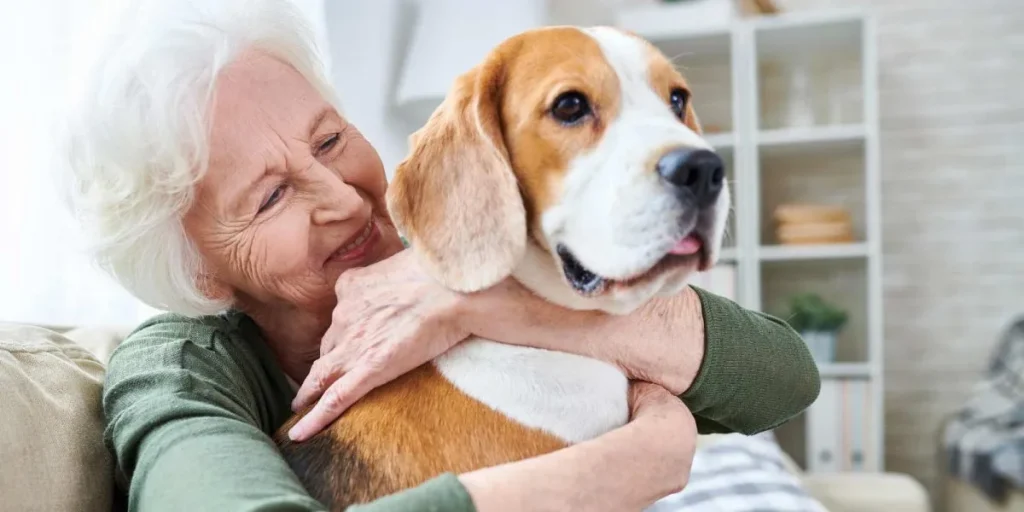
The Pros and Cons of Pet Care for the Elderly
Human relationship with pets is an emotional and supportive relationship, and it can have many positive effects on people’s mental and physical health. This relationship usually includes care, affection and interaction with these types of animals. Pets can act as loyal companions and friends who are always with us. Pet care for the elderly can have many benefits such as reducing stress and anxiety, improving mood, enhancing physical activity, improving mental health, enhancing memory and creating life order.
It should be noted, however, that this may also lead to challenges and disadvantages such as health risks and injuries, transmission of diseases and allergies, financial costs and life limitations. Pets care can be stressful for some elderly, especially if animal needs are more than the physical and mental abilities of the elderly.
For elderly and families who are interested in keeping pets, the question is always raised whether a pet is beneficial or harmful to the elderly. To answer this question, we have discussed the psychological and physical benefits of keeping pets for the elderly in this article from the Human Health Mag website. We have also outlined important tips on how the elderly keep pets.
Is Owning a Pet Good for the Elderly?
Keeping pets by the elderly, good or bad? What do you think? Pet care by the elderly make them to increase their physical activity and improve their morale. Staying at home and depression is one of the most common problems among the elderly that can incapacitated them faster than every time. One of the ways to improve the mood of the elderly is pet therapy that has had positive results.
One of the simplest and most convenient ways that can entertain the elderly and cause them to have better morale is to keep pets. You can buy a pet for them according to their tastes and physical abilities. We must keep in mind that having a pet in old age is not suitable for everyone.
It is better to ask for their opinion before taking on the responsibility of taking care of a pet and to consult with other family members, the elderly doctor or even a veterinarian about the decision we have made. Only if our elderly person has the physical strength and interest to keep a pet, it is recommended for him to take over a pet. Having a dog, cat or bird in old age can be the best medicine and at the same time the best friend for our heroes.
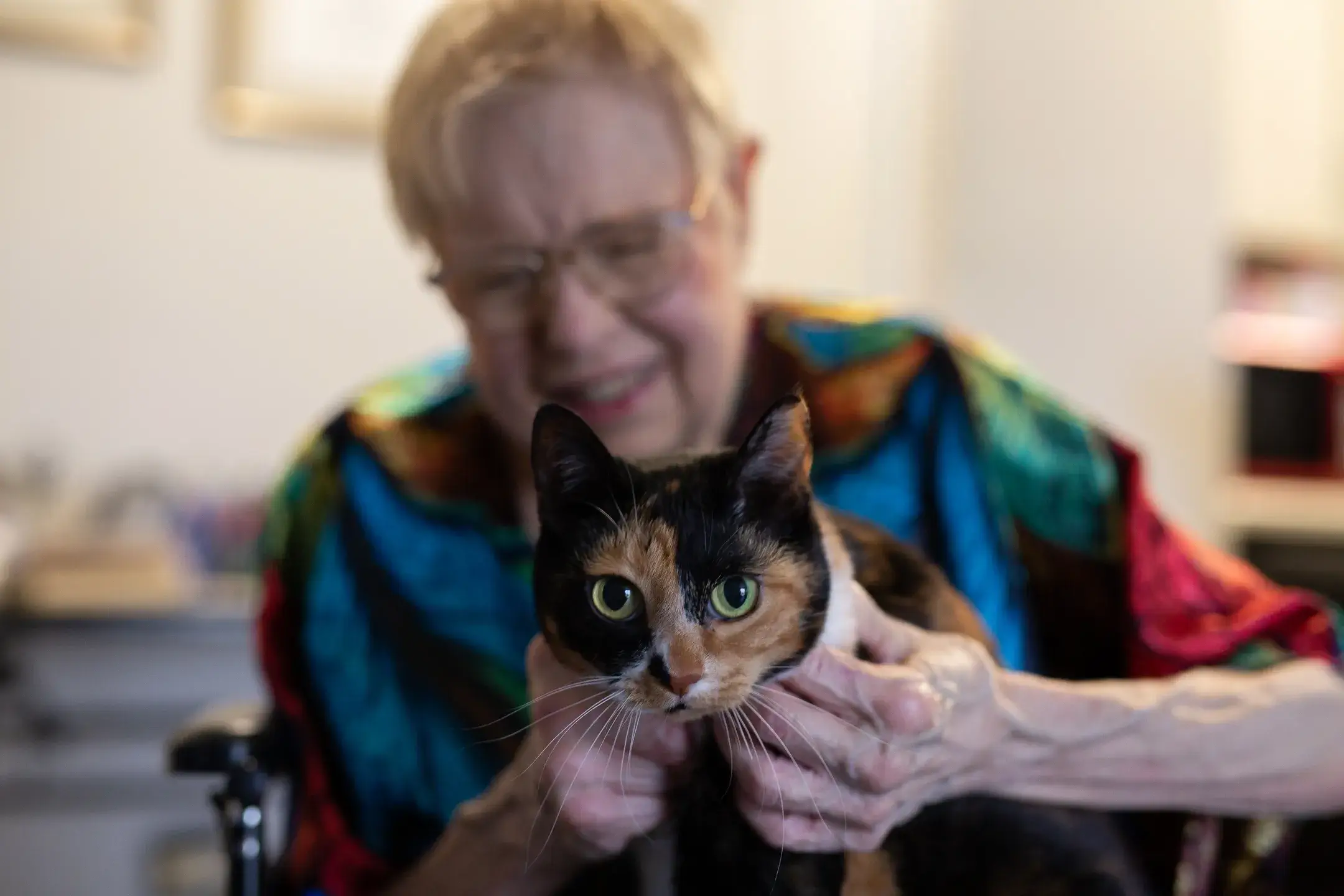
The Benefits of Pets for Seniors
Young and middle -aged people have wider social relations due to physical health, economic and business activities. They are invited to multiple parties, hold more parties, and spend more time with their friends; But with age, social and family -friendly activities decrease, and the elderly loses most of their relationships. This makes him/her spend a lot of his/her life alone, which is certainly unpleasant to everyone. Loneliness causes the elderly to become lonely, lonely and aggressive and even lose the desire to eat.
How do pets contribute to healthy aging? At a time when all people have to work to support the economic expenses of the family, they have less opportunity to pay a visit to the elderly. Elderly people also face the problem of not having a companion. So the presence of pets, even a canary or lovebird, can have a very positive effect on the spirit of the elderly. Having small birds that lay eggs and hatch chicks from time to time can awaken the enthusiasm for life in the elderly.
What are the advantages of keeping pets for a senior? Keeping pets, even having a small aquarium and a few fish, makes the elderly more active. Taking care of these animals or taking them to the bathroom and cleaning their living environment gives them a sense of usefulness and vitality.
Some pets need to be walked daily. For example, to take care of a dog, you must take it for a walk every day and play with it. Cats are lively animals and are willing to play with you for hours. These activities increase physical activity and improve the heart and physical health of the elderly. On the other hand, trained dogs have the ability to provide some assistance to the elderly, which can be a very useful helping hand for the person and greatly reduce their feelings of loneliness or disability.
Going out of the house under the pretext of walking the animals allows the elderly to meet more people and make more friends. Expanding social relationships improves the morale of the elderly. According to studies, petting and hugging animals for 15 minutes a day reduces the stress hormone cortisol in people and increases the secretion of the happy hormone serotonin, which will have a positive effect on preventing cardiovascular diseases and strokes.
Then, pet care for the elderly can help enhance social skills and build new communication. This relationship acts as a source of emotional and social support for the elderly and improves their quality of life. It also has many psychological and physical benefits. Pets need physical activity and play. The elderly can help both their animal health and animal health by playing and walking with their animals.
Psychological Benefits
Depending on the senior’s condition and mood, pet care for the elderly may have many psychological benefits for them. Some of these good psychological benefits of owning a pet for a senior include:
- Reducing feelings of loneliness in elderly and improve mental health
- The responsibilities associated with pet ownership can help create order and careful planning in the senior’s daily life and increase their sense of responsibility and purpose.
- Interacting with pets can improve elderly mood disorders and reduce stress in the elderly and anxiety levels in them, and increase feelings of calm and security.
- Caring for pets can increase feelings of worth, self-confidence, and self-esteem in older adults.
- Pets can be a source of love and emotional support that can help reduce feelings of depression.
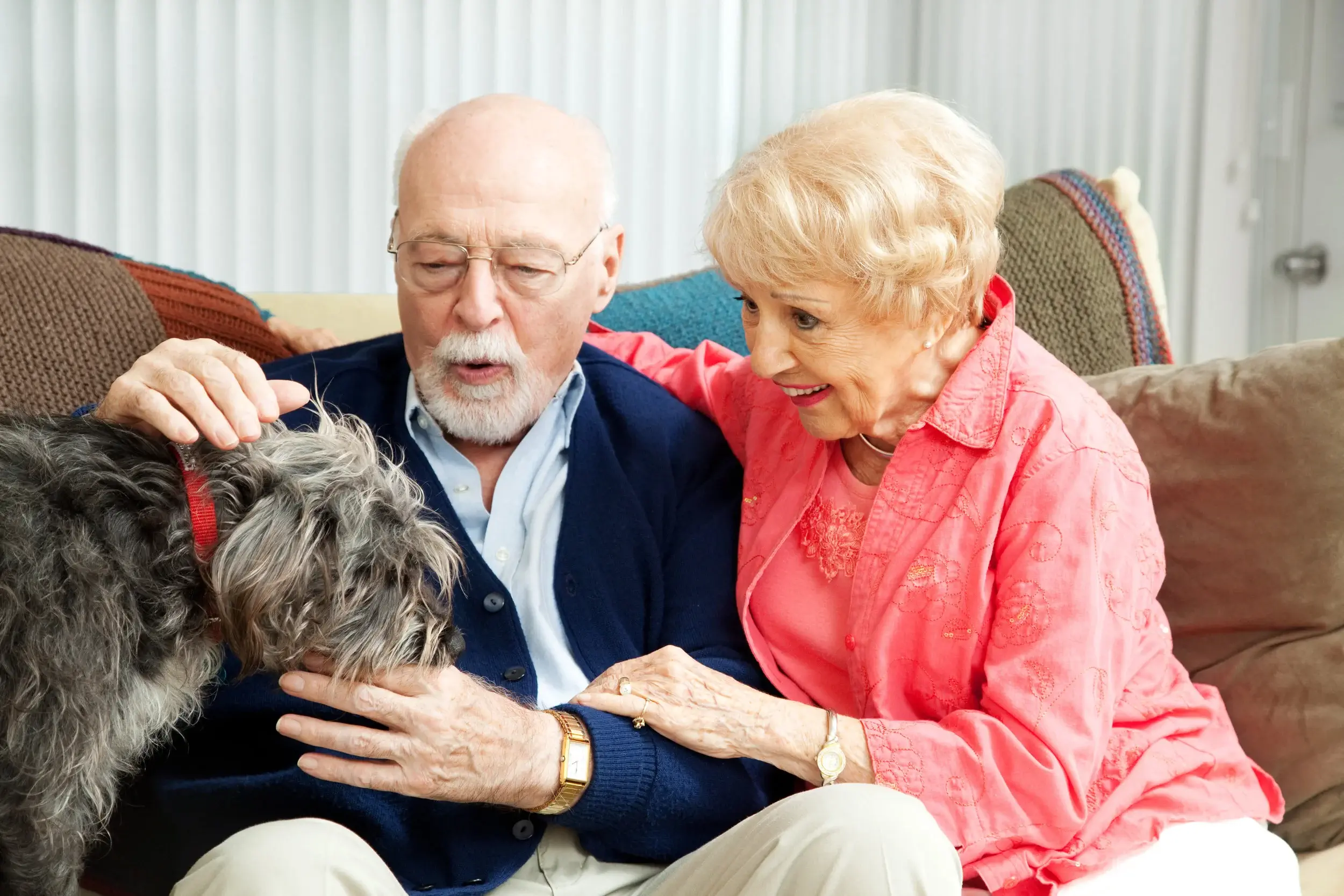
Physical Benefits
In addition to psychological benefits, pet care for the elderly also has numerous physical benefits. These benefits of keeping pets for the elderly can help improving the lifestyle of elderly and keep them physically and mentally healthier:
- Increase physical activity: Caring for pets, especially dogs, requires physical activity such as walking and playing, which can help improve physical health.
- Strengthen the immune system: Interacting with pets correctly and by following hygiene tips can help strengthen the immune system and prevent the occurrence of some diseases.
- Reduce blood pressure and improve cardiovascular health: Research has shown that pet ownership can help reduce blood pressure and improve cardiovascular health.
- Improve sleep: Spending time caring for animals and doing other activities such as walking with animals, as well as stress reduction for elderly and supporting elderly with depression, will improve sleep quality in seniors.
- Help improve motor skills: Interacting with and caring for animals improves the motor skills of seniors.
Potential Harms and Disadvantages of Pet Care for the Elderly
What are the potential drawbacks of owning a pet for an elderly person? Keeping pets, while it can have many benefits, can also come with challenges and disadvantages. However, many of these problems can be managed by following health tips and choosing the right pet. Here are some of the potential disadvantages of pet care for the elderly:
- Animals require daily care such as feeding, grooming, and walking, which may not be possible for some seniors.
- The pet’s living environment should be cleaned regularly.
- The costs of keeping and caring for pets, such as pet food, hygiene items, and veterinary fees, can be a financial burden for some seniors.
- Some elderly people may be allergic to animal hair, in which case they should consult a specialist doctor.
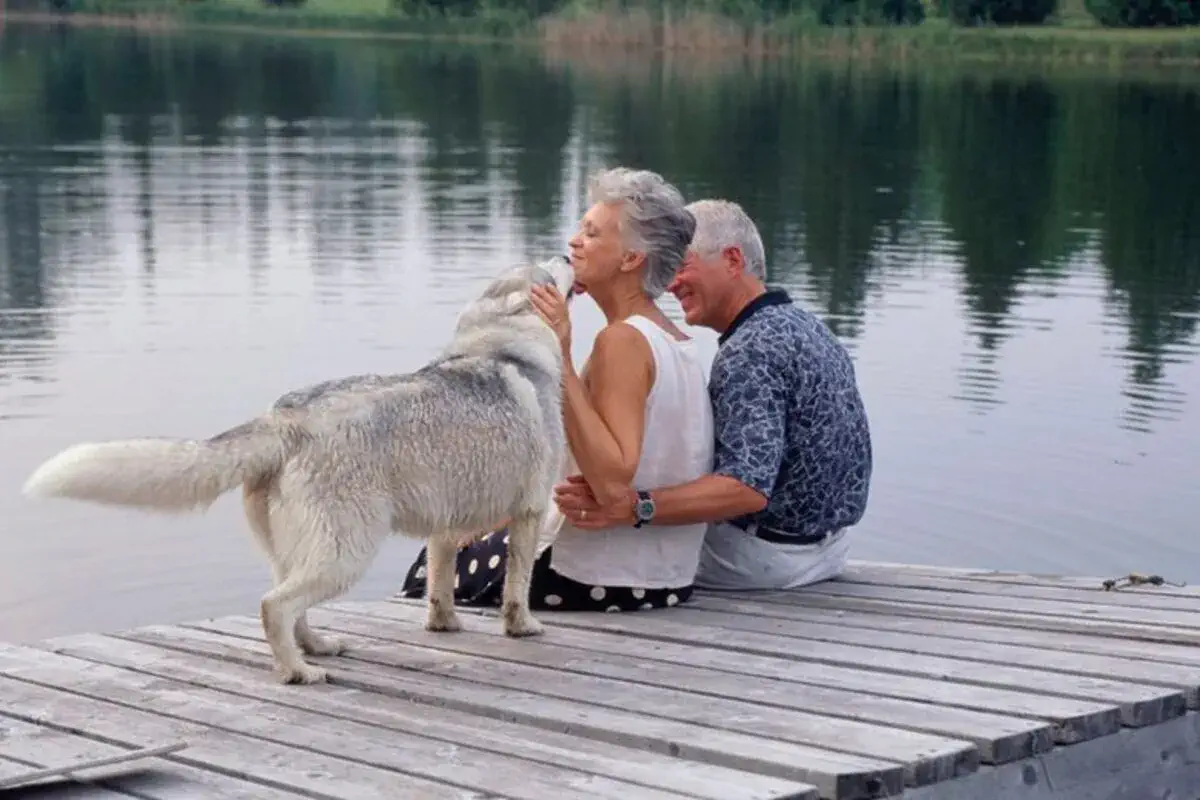
- Pets may carry diseases and parasites that can be transmitted to humans due to health problems or lack of proper care, especially if they are not vaccinated regularly.
- Seniors who care for pets are constantly exposed to injuries such as bites and scratches on their skin.
- Keeping pets requires strict hygiene. Lack of hygiene can lead to health problems for seniors.
- Having pets may place restrictions on travel and elderly entertainment and recreation.
What Is the Best Pet for an Elderly Person?
You should choose a pet that does not require much care. For example, taking care of a puppy or kitten requires a lot of attention and effort that most seniors cannot handle; so in such cases, you should choose an adult animal that does not require much attention. Make sure that the pet you buy for the elderly must have a veterinarian’s health certificate, and if necessary, inject the necessary vaccines and parasites needed by the animal on time so that common diseases between animals and humans or possible parasites in animal feces do not cause problems.
If your senior has a weak immune system, do not use animals that carry allergic diseases, respiratory and skin allergies at all. If your senior is unable to walk, it is better to choose an animal that has a quiet lifestyle and does not require you to follow him/her. For example, taking care of a cat or birds that are kept in a cage does not require much movement. If your senior is able to move and play, you can choose a dog for him/her, but it is better to choose a breed that is gentle, kind, and intelligent, makes less noise, sheds less hair, and is not large.
The, which is the best pet for senior woman or an elderly man? Some pets protect the elderly, giving them peace of mind and a sense of security. Although dogs are better protectors than most other animals, cats and birds can also make enough noise to alert their owners when they are in danger.
The, some pets that can be suitable for the elderly include:
- Small dogs: These types of dogs can be suitable for the elderly due to their small size and need for less activity.
- Cats: Cats do not need to be walked and can easily live in indoor environments.
- Birds: Birds such as canaries and lovebirds can be suitable pets for the elderly, and their singing can be soothing.
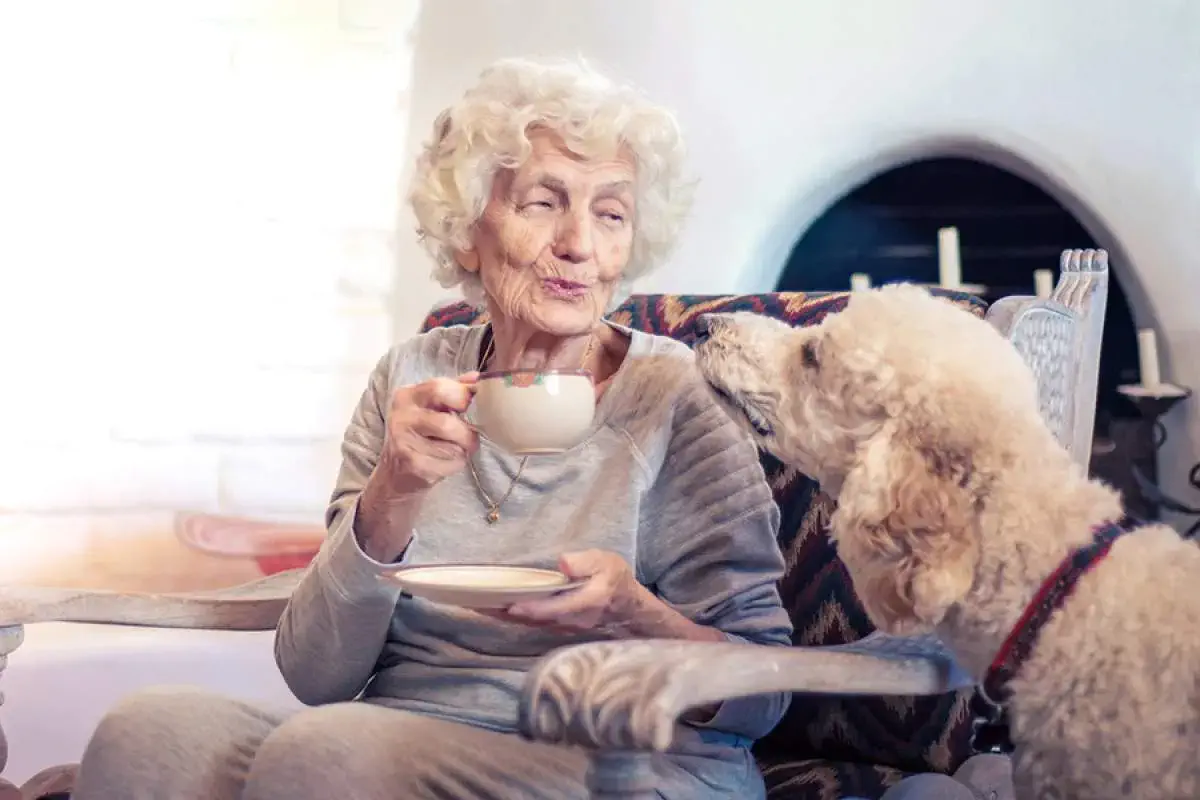
Pet Care Tips for Older Adults
Taking care of pets for seniors can be a pleasant and useful experience, but it needs to follow certain points to make this experience as good as possible. Here are some important tips for pet care for the elderly:
- Choosing the proper pet: It is important to choose a pet that is compatible with the lifestyle and physical abilities of the elderly. Animals that require less care and less physical activity, as well as a more appropriate size, may be better.
- Consult a doctor: Pets should be examined regularly by a veterinarian and receive the necessary vaccinations. This helps to maintain the animal’s health and prevent the transmission of diseases. Consulting a veterinarian can help in choosing the best diet for the animal.
- Getting help from others: Since keeping pets requires time-consuming care, it is better to get help from an elderly nurse, family or friends to take care of the animal when necessary.
Concluding Remarks
In this article, we discussed the benefits and disadvantages of keeping pets by the elderly. Some of the most important of these benefits include things like reducing feelings of isolation and symptoms of depression, increasing a sense of responsibility, improving mood and self-confidence, as well as physical and health benefits in the elderly.
Also, some of the disadvantages of pet care for the elderly include caregiving responsibilities, health risks, and creating limitations in life. Taking care of pets is a practice that should be done by individual decision and according to the specific conditions of each person. we recommend to consult veterinarians to choose the right animal and evaluate the animal’s physical health. Some pets may be carriers of diseases that can be transmitted to humans. Consulting with a doctor can help seniors feel more confident caring for their pets and reap the psychological and physical benefits.
Don’t just read; also engage and inspire! What did this post teach you, and how will you apply it? Does your senior also care for a special animal? Please leave your experience in the comments, and let’s learn from each other!

Frequently Asked Questions
Reducing stress and anxiety with the help of pets, yes or no?
Stroking and playing with pets can act as a calming activity and reduce stress hormones such as cortisol. These activities can also help improve sleep in the elderly.
What is the effect of keeping pets on elderly depression?
Depression among the elderly is a common and serious health problem that can negatively affect their quality of life. There are various factors for improving depression, but in recent years, keeping pets, especially dogs, has been proposed as one of the effective ways to reduce symptoms of depression. Research has shown that interacting with pets can help improve the mental and physical health of the elderly.
